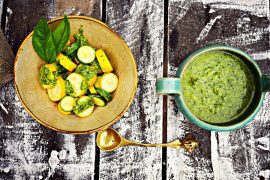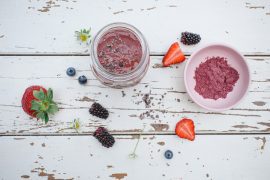See next page for more….
For both women and men, maintaining a healthy weight is really important as being overweight results in extra female sex hormones and also extra male sex hormones being produced and this can quickly upset hormone balance and affect fertility.
Being underweight can also affect female fertility, with ovarian function being reduced or even stopped altogether with a body mass index (BMI) below 18.
The good news is that if either or both partners are overweight (a BMI of above 25), individual weight loss of 5-10% can result in improved hormone regulation and therefore improved fertility.
Following a plant based diet has been shown to aid weight loss and improve blood fat levels, among other health benefits and reasons for this include a reduction in saturated fat and total energy intake and an increase in dietary fibre which helps regulate appetite and stops overeating. In addition, the fibre in plants binds with both cholesterol and excess hormones in your intestines and helps remove them from your body.
There is data to suggest that women who eat larger amounts of non-haem iron (vegetarian sources) are at decreased risk of ovulatory infertility and this is likely due to the inflammatory effect of haem iron (from animal products).
It has been shown in trials that replacing 25g of animal protein with 25g of plant protein reduces the risk of ovulatory fertility by 50%, a significant reduction.
Some examples of non- haem iron include nuts, seeds, beans, lentils, chickpeas and dried fruit. It is important to consume vitamin C alongside these foods to help your body absorb the iron and to avoid drinking tea, coffee and red wine with meals as these reduce absorption.
When summarizing current dietary evidence in terms of boosting fertility and improving the chances of conception , I would recommend eating a varied plant based diet, including whole grains, nuts, seeds, fruit and vegetables and legumes (such as chickpeas, lentils and beans), as well as including non processed forms of soya such as edamame beans, tofu and tempeh. If you cook with oils, choose vegetables oils that are liquid at room temperature and avoid coconut oil as this is extremely high in saturated fat.
References
- Barnard, N.D (2020); Your Body In Balance, New York, Grand Central Publishing.
- Bergh et al (2016); Evidence Based Management of Infertility in Women with Polycystic Ovary Syndrome, Journal of Obstetric, Gynecologic and Neonatal Nursing; 45(1), 111-122
- Chavarro et al (2008); Protein Intake and Ovulatory Infertility, American Journal of Obstetric Gynecology; 198(2)
- NICE (2010); Weight management before during and after pregnancy, Retrieved from https://www.nhs.uk/Planners/pregnancycareplanner/Documents/NICE_reference_weight_management_pregnancy.pdf
Lisa is a registered plant based Dietitian who worked in the NHS for five years before leaving in 2019 to set up her own freelance business. Frind Lisa on Instagram, Facebook and her website










